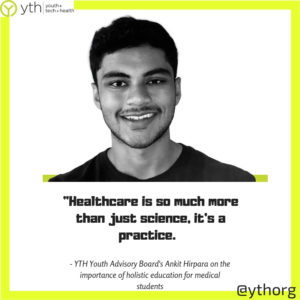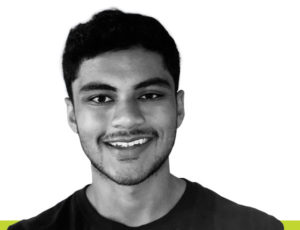By: Ankit Hirpara
This post is a part of a series of articles written by a member of our YTH Youth Advisory Board.
If we look back in time, we can quickly realize that humans have been able to create amazing advancements in science, medicine, technology, and healthcare. For example, Jennifer Doudna co-discovered CRISPR-Cas9, a fascinating gene-editing technology. Physicians can now access patients’ medical records with the click of a button, thanks to electronic health records. Surgeons even completed a double-face transplant in April of 2018.
But of course, there is still a long way to go. We still don’t have cures for chronic diseases like cancer and Alzheimer’s, and healthcare is inaccessible to many people in the United States. In fact, one in five American adults under 65 have an unmet medical need because of costs, according to health policy expert Genevieve Kenney. There is a desperate need for a stronger community health infrastructure, disease prevention, and much, much more. The one thing these public health issues have in common is that they require holistic approaches to be truly solved.
What do I mean by holistic? I came upon this idea when I joined the City of Berkeley’s homeless commission. A pre-medical student myself, I strived to promote health equity in the homeless community. However, I faced one, major roadblock; I did not know where to start. Although I learned all about diseases from a biological perspective in my science classes, this knowledge was not nearly enough to make a real-world, tangible impact in the homeless community.
I soon realized that I needed to learn about the sociological factors that force homeless people into a cyclical form of social reproduction – the reason why homeless people, more often than not, remain homeless. I needed to learn about the City of Berkeley’s policies, as well as California’s policies, on homelessness. I needed to learn about the attempts made by other cities to alleviate homeless people’s increased risk to various diseases, such as hepatitis A and HIV. But it was more than just a learning process. I needed to acquire skills as well. I practiced my ability to lobby and be persuasive and concise. I developed my professional skills when speaking with councilmembers. Public speaking indeed became the new norm.
Eventually, I was able to work with my fellow commissioners, councilmembers, and the mayor to follow through with a plan to establish port-a-potties and sanitation areas at homeless encampment sites. This was a small, but effective, step to reduce their risk to hepatitis A during California’s outbreak. Even such a relatively minor feat demanded so much more from me than what I had learned in my science classes. I realized that my desire to impact healthcare required a focus on more than just biology; it required a focus on sociology, writing, public speaking, public health, and public policy.
Much of my undergraduate experience consisted of a never-ending supply of science courses. These were, without a doubt, important knowledge-gaining ventures that I immensely enjoyed, but again, not enough to allow me to directly make an impact in the real world. As such, I began taking courses outside of the scope of my major, including in sociology, statistics, and literature. By doing so, I have learned how to communicate, persuade, identify problems in my community, and solve them using integrated approaches.

My realization was also supported by my experience at MedHacks at the Johns Hopkins School of Medicine. Here, I worked in a team to develop an application that generated a curated news feed of clinical trials, condensed research articles, and local health resources, based on a user’s survey. Moreover, I was inspired by all the amazing ideas that others had developed using computer science. Many of my fellow participants built applications that reduced the harmful effects of food deserts, fixed the language barriers between immigrants and physicians, identified a patient’s vulnerable areas to bed sores, and so much more! This experience reaffirmed to me the value of a holistic education for students who seek to advance healthcare.
Moving forward, I will continue to step outside of my comfort zone and obtain an interdisciplinary education, inside and outside the classroom. Because healthcare is so much more than just science, it’s a practice.

Ankit Hirpara is a Junior at UC Berkeley majoring in Molecular & Cellular Biology. His passion for medicine developed after his internship at Wockhardt Hospital in India, where he helped physicians set up health camps in impoverished villages and provided lectures in English and Gujarati on HIV transmission. After this trip, he decided he wanted to impact medicine by paying special attention to the socioeconomic determinants of health.
He currently serves on the City of Berkeley’s homeless commission, representing District 7, and has developed lasting relationships with many underserved persons on the streets of Berkeley. As a pre-med, Ankit intends to impact healthcare through biomedical research, policy making, and clinical work.
